Speaking out: opposing camps state their reasons for and against an Indigenous voice to parliament
The 2000-word Yes and No voice pamphlets are unveiled as Anthony Albanese concedes the supporting case ‘needs to be stronger’ | READ BOTH SIDES
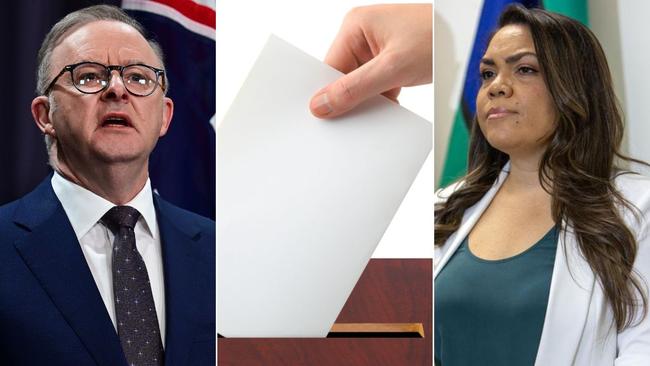
Australians will be told the Indigenous voice to parliament is a “leap into the unknown” when they receive the official No pamphlet in the mail, while the Yes brochure promises constitutional recognition with concrete results, as Anthony Albanese concedes the Yes case needs to be made stronger.
The Prime Minister revealed he wouldn’t announce the referendum date until September at the earliest as the Yes and No pamphlets were lodged with the Australian Electoral Commission, which will publish the respective 2000-word essays on its website on Tuesday and mail them out to 12.5 million households at least two weeks before polling day.
Indigenous voice to parliament pamphlets: Yes and No supporters state their referendum case
The No campaign cites 10 reasons why Australians should oppose the voice ahead of rolling out a $1m social media blitz designed to “explode the myth” that it was supported unanimously by the Indigenous community.
The Yes campaign lays out eight reasons voters should back the referendum, saying it is about constitutional recognition, listening to advice from Aboriginal and Torres Strait Islander people about matters affecting them, and making practical progress in Indigenous health, education, employment and housing to improve people’s lives.
Mr Albanese insisted the referendum was not “dead in the water” after the latest Newspoll showed a continued downwards trend with just 41 per cent of Australians saying they would vote Yes and 48 per cent saying they would vote No.
He vowed to “have a crack” and put the government’s model for constitutional recognition and a voice – endorsed by Indigenous leaders in Labor’s referendum working group – to the Australian people in the final quarter of the year.
“Most Australians … will focus when the referendum is actually being held. It’s a while to go yet,” Mr Albanese told Sky News.
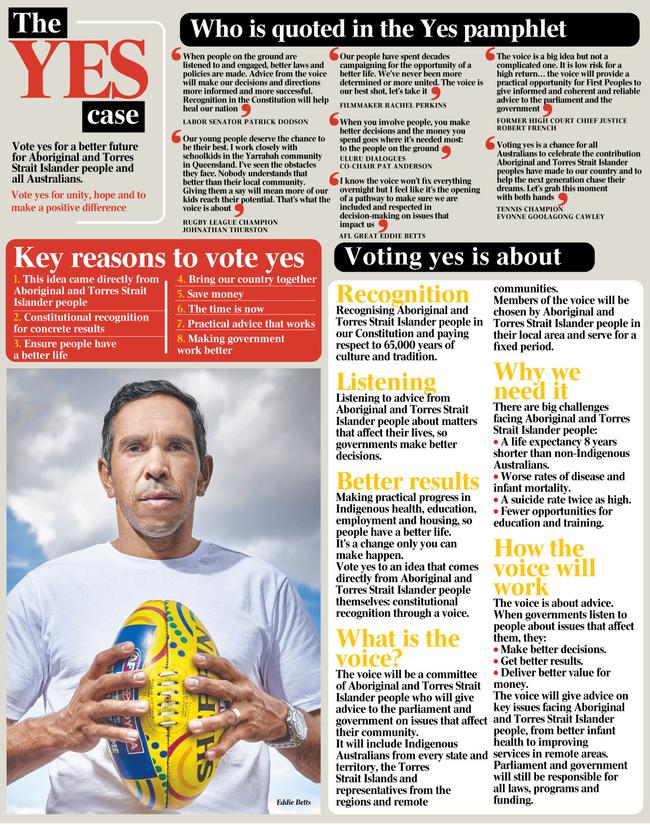
“What we know is that there’s been a considerable No campaign already that is out there just trying to sow doubt. The Yes campaign needs to be stronger in putting the case because we know that referendums in Australia have been difficult in the past. Only eight out of 48 (have succeeded) but this is a clear and simple proposition for recognition and then listening in order to achieve better outcomes for Indigenous Australians.”
The date for the referendum is not expected to be announced until 33 days before the vote, or slightly earlier.
Government insiders had previously believed the date would be announced at the Garma festival at the start of August but Mr Albanese said he did not think the campaign needed to be very long.
If the referendum is in October, as most voice supporters expect, the date would be announced in September.
The Yes pamphlet, featuring Indigenous sport stars Evonne Goolagong Cawley and Johnathan Thurston, offers eight “key facts” on what the voice is, leading with it being an idea that came from Aboriginal and Torres Strait Islander people, and says it will bring Australia together, save taxpayers money and make government work better.
“The idea of a voice has been decades in the making. Many Aboriginal and Torres Strait Islander people have put in a great deal of hard work and goodwill,” the Yes case states.
“Voting No means nothing will change. It means accepting we can’t do better. Don’t risk more of the same: worse life expectancy, worse results in education and employment, worse outcomes in health. Vote Yes to break this cycle and unite our nation.”
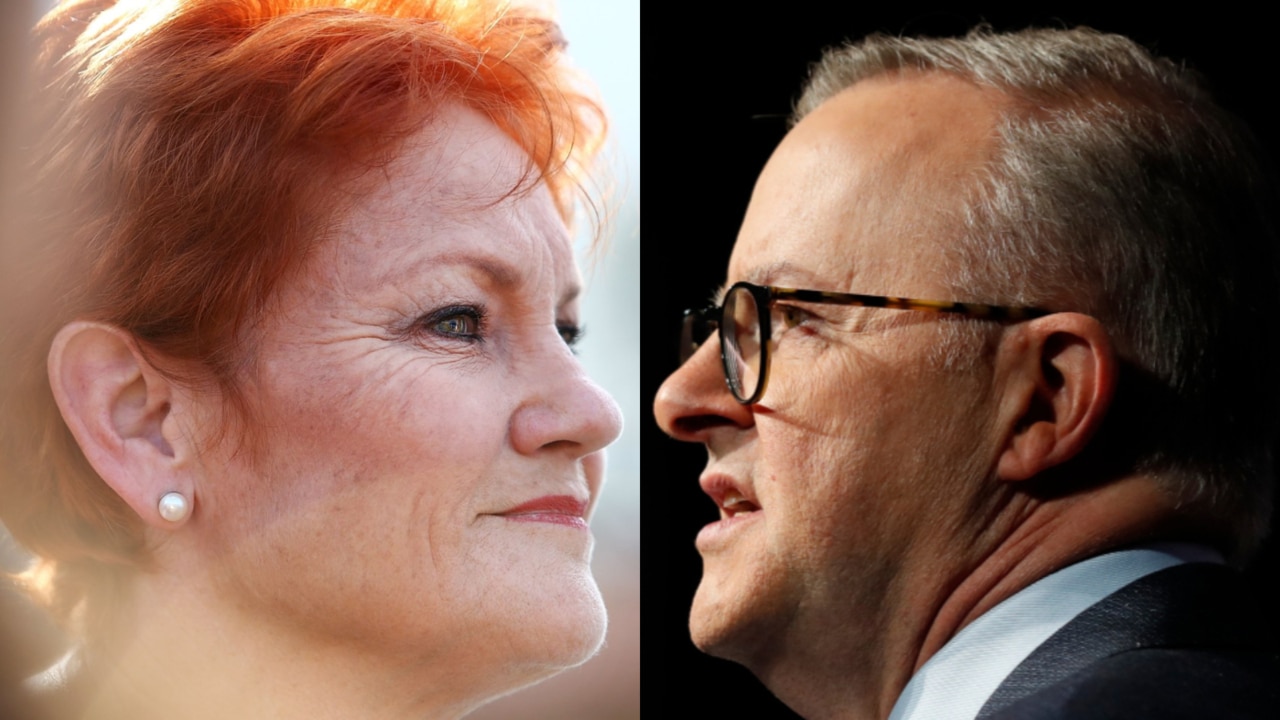
The No pamphlet, obtained by The Australian, argues that a constitutionally enshrined voice to parliament and executive government is legally risky, provides no detail on how it would work, would divide Australians, fail to help Indigenous communities, and no issue would be beyond its scope.
It also argues that the voice, being permanent, would cause dysfunction within parliament, open the door to activists and be costly and bureaucratic.
“This referendum is not simply about ‘recognition’,” it says.
“This voice proposal goes much further. If passed, it would represent the biggest change to our Constitution in our history. It is legally risky, with unknown consequences. It would be divisive and permanent. It is a leap into the unknown. This voice has not been road tested. There is no comparable constitutional body like this anywhere in the world.”
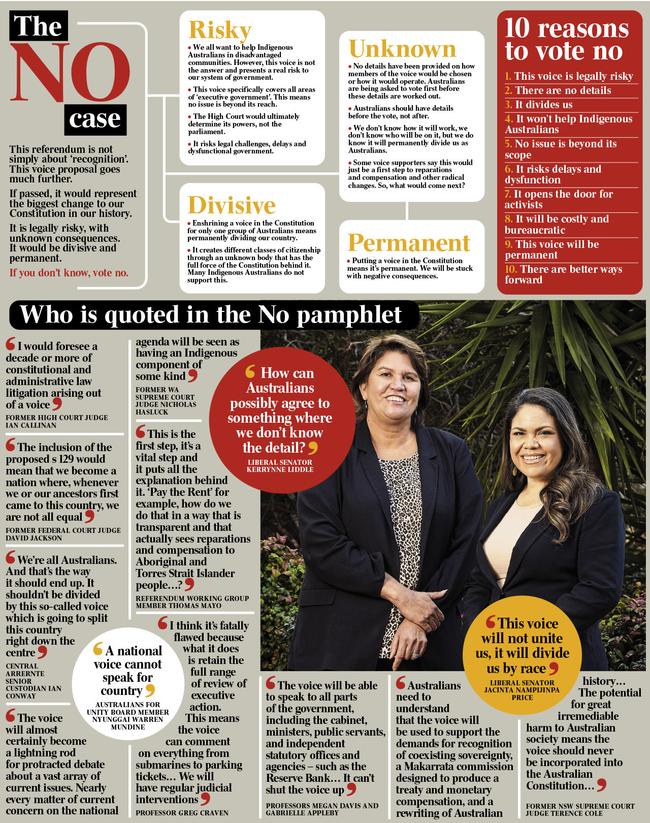
The official No campaign will this week launch as second phase of its advertising campaign aiming to expose divisions among leading Aboriginal figures over the need for a voice to be enshrined in the Constitution. Spearheaded by Nyunggai Warren Mundine, Fair Australia will run a mini documentary nationally across special media platforms and television in which the Indigenous leader claims the voice would not improve people’s lives. Called Not My Voice, the campaign is based on Mr Mundine’s personal story of growing up in regional Australia and becoming one of Australia’s most prominent political and business leaders. “I have never needed a separate voice based on the colour of my skin,” Mr Mundine says.
He makes the case that the divisive voice to parliament is a “project of inner-city elite Indigenous activists”. “They’re the same people who have been on government boards and committees for decades and now they want to be in the Constitution,” Mr Mundine says. “They don’t speak for me and they don’t speak for many other Aboriginals.”
Liberals for Yes spokesman Julian Leeser, who quit the frontbench over his party’s opposition to a constitutionally enshrined voice, rejected arguments put by Mr Mundine and his colleagues that the voice would mark “the end of democracy, (with) more power going to so-called elites, the end of parliamentary sovereignty, with increased costs resulting from a dangerous, permanent change”.
“This is a change that is safe, and a change that is about practical outcomes for Aboriginal and Torres Strait Islander Australians,” Mr Leeser said in a Yes campaign speech in Wagga Wagga.
“The voice will advise government – just like DFAT, the Productivity Commission, the security agencies and the Chief Scientist and the Chief Medical Officer do every day. It will be up to the government to weigh that advice. As they do now.”

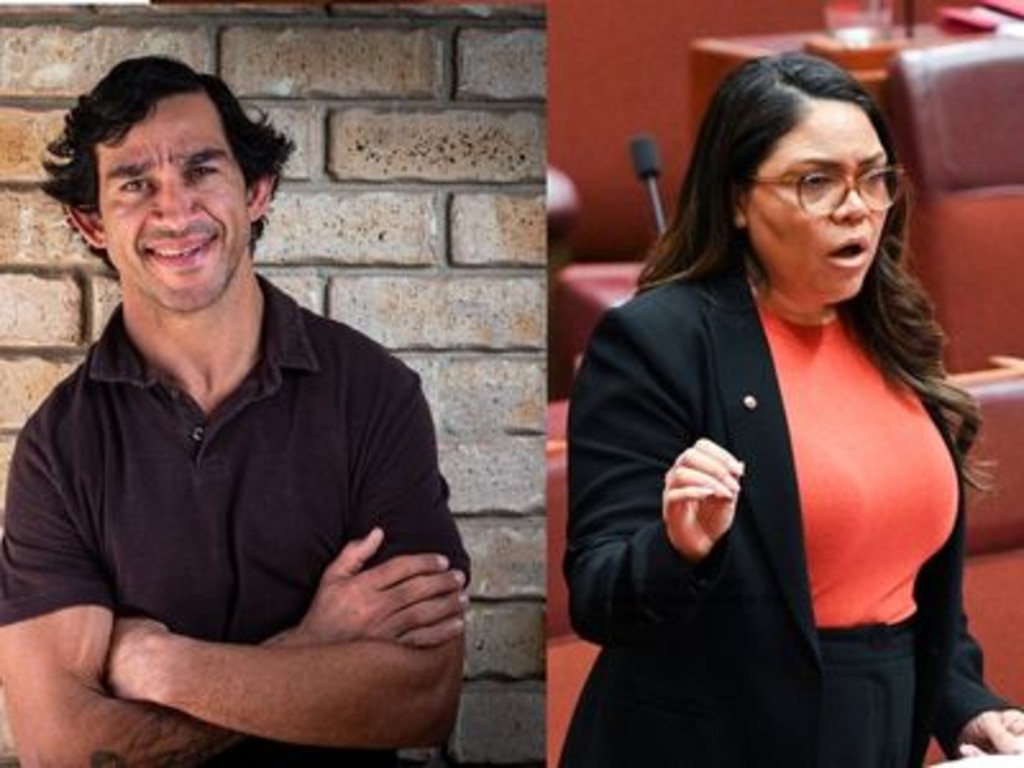
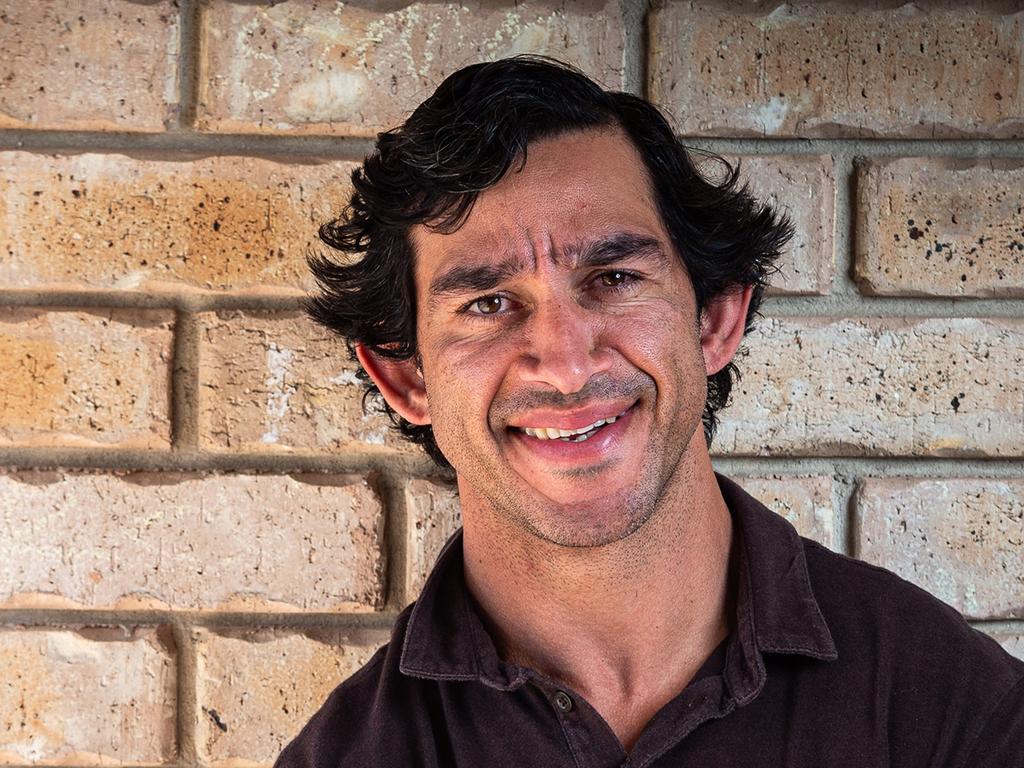
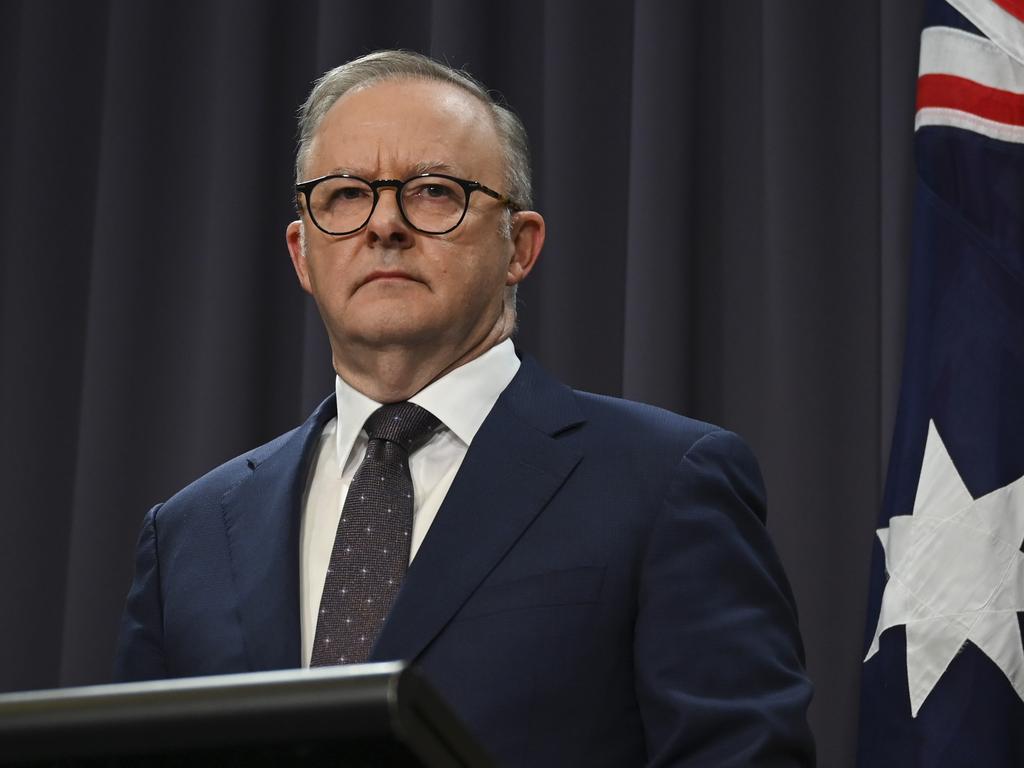
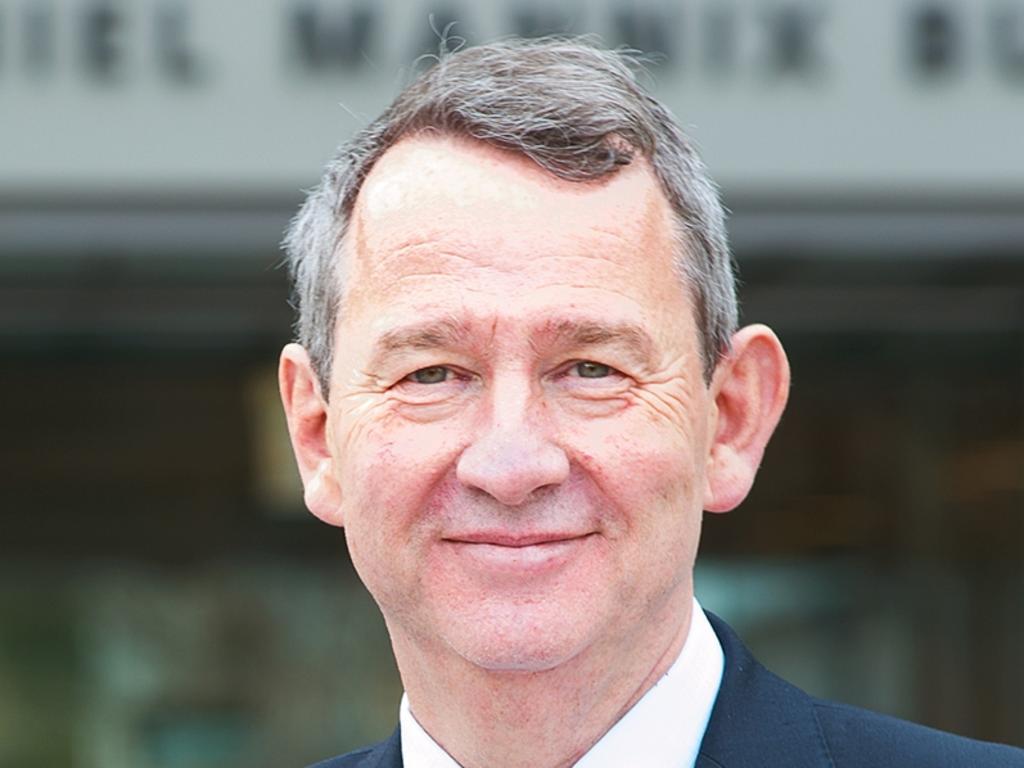


To join the conversation, please log in. Don't have an account? Register
Join the conversation, you are commenting as Logout